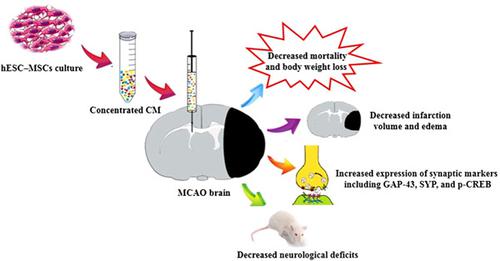当前位置:
X-MOL 学术
›
J. Cell. Physiol.
›
论文详情
Our official English website, www.x-mol.net, welcomes your
feedback! (Note: you will need to create a separate account there.)
The conditioned medium of human embryonic stem cell-derived mesenchymal stem cells alleviates neurological deficits and improves synaptic recovery in experimental stroke.
Journal of Cellular Physiology ( IF 4.5 ) Pub Date : 2020-07-30 , DOI: 10.1002/jcp.29981 Afsaneh Asgari Taei 1 , Leila Dargahi 2 , Sanaz Nasoohi 3 , Gholamreza Hassanzadeh 1, 4, 5 , Mehdi Kadivar 6 , Maryam Farahmandfar 1, 7
Journal of Cellular Physiology ( IF 4.5 ) Pub Date : 2020-07-30 , DOI: 10.1002/jcp.29981 Afsaneh Asgari Taei 1 , Leila Dargahi 2 , Sanaz Nasoohi 3 , Gholamreza Hassanzadeh 1, 4, 5 , Mehdi Kadivar 6 , Maryam Farahmandfar 1, 7
Affiliation

|
The transplantation of mesenchymal stem cells (MSCs) is of main approaches in regenerative therapy for stroke. Due to the potential tumorigenicity and low survival rate of transplanted cells, focuses have been shifted from cell replacement to their paracrine effects. Therefore, stem cell‐conditioned medium (CM) therapy has emerged as an alternative candidate. Here, we investigated the effect of CM derived from human embryonic MSCs on experimental ischemic stroke. Wistar rats underwent ischemic stroke by the right middle cerebral artery occlusion (MCAO). CM was infused either one time (1 hr post‐MCAO) or three times (1, 24, and 48 hr post‐MCAO) through guide cannula into the left lateral ventricle. Neurological functions were evaluated using Bederson's test and modified Neurological Severity Score on Days 1, 3, and 7 following MCAO. Infarction volumes and cerebral edema were measured on Days 3 and 7. growth‐associated protein‐43, synaptophysin, cAMP response element‐binding protein, and phosphorylated‐cAMP response element‐binding protein levels were also assessed in peri‐ischemic cortical tissue on Day 7 postsurgery. Our results indicated that three times injections of CM could significantly reduce body weight loss, mortality rate, infarct volumes, cerebral edema, and improve neurological deficits in MCAO rats. Moreover, three injections of CM could restore decreased levels of synaptic markers in MCAO rats up to its normal levels observed in the sham group. Our data suggest that using the CM obtained from embryonic stem cells–MSCs could be a potent therapeutic approach to attenuate cerebral ischemia insults which may be partly mediated through modulation of synaptic plasticity.
中文翻译:

人胚胎干细胞衍生的间充质干细胞的条件培养基可减轻实验性中风中的神经缺陷并改善突触恢复。
间充质干细胞(MSC)移植是中风再生治疗的主要方法。由于移植细胞潜在的致瘤性和低存活率,焦点已从细胞替代转移到其旁分泌作用。因此,干细胞条件培养基(CM)疗法已成为替代候选疗法。在这里,我们研究了源自人胚胎 MSC 的 CM 对实验性缺血性中风的影响。 Wistar 大鼠因右侧大脑中动脉闭塞(MCAO)而发生缺血性中风。通过引导插管将 CM 注入左侧脑室一次(MCAO 后 1 小时)或三次(MCAO 后 1、24 和 48 小时)。在 MCAO 后第 1、3 和 7 天,使用 Bederson 测试和改良的神经严重程度评分来评估神经功能。第 3 天和第 7 天测量梗塞体积和脑水肿。第 7 天还评估了缺血周围皮质组织中的生长相关蛋白 43、突触素、cAMP 反应元件结合蛋白和磷酸化 cAMP 反应元件结合蛋白水平。 7 术后。我们的结果表明,注射3次CM可以显着减少MCAO大鼠的体重减轻、死亡率、梗塞体积、脑水肿,并改善神经功能缺损。此外,注射 3 次 CM 可以将 MCAO 大鼠中下降的突触标记物水平恢复至假手术组中观察到的正常水平。我们的数据表明,使用从胚胎干细胞 - MSC 获得的 CM 可能是减轻脑缺血损伤的有效治疗方法,这可能部分是通过调节突触可塑性介导的。
更新日期:2020-07-30
中文翻译:

人胚胎干细胞衍生的间充质干细胞的条件培养基可减轻实验性中风中的神经缺陷并改善突触恢复。
间充质干细胞(MSC)移植是中风再生治疗的主要方法。由于移植细胞潜在的致瘤性和低存活率,焦点已从细胞替代转移到其旁分泌作用。因此,干细胞条件培养基(CM)疗法已成为替代候选疗法。在这里,我们研究了源自人胚胎 MSC 的 CM 对实验性缺血性中风的影响。 Wistar 大鼠因右侧大脑中动脉闭塞(MCAO)而发生缺血性中风。通过引导插管将 CM 注入左侧脑室一次(MCAO 后 1 小时)或三次(MCAO 后 1、24 和 48 小时)。在 MCAO 后第 1、3 和 7 天,使用 Bederson 测试和改良的神经严重程度评分来评估神经功能。第 3 天和第 7 天测量梗塞体积和脑水肿。第 7 天还评估了缺血周围皮质组织中的生长相关蛋白 43、突触素、cAMP 反应元件结合蛋白和磷酸化 cAMP 反应元件结合蛋白水平。 7 术后。我们的结果表明,注射3次CM可以显着减少MCAO大鼠的体重减轻、死亡率、梗塞体积、脑水肿,并改善神经功能缺损。此外,注射 3 次 CM 可以将 MCAO 大鼠中下降的突触标记物水平恢复至假手术组中观察到的正常水平。我们的数据表明,使用从胚胎干细胞 - MSC 获得的 CM 可能是减轻脑缺血损伤的有效治疗方法,这可能部分是通过调节突触可塑性介导的。











































 京公网安备 11010802027423号
京公网安备 11010802027423号